First World Robot Olympiad Experiences
Published on Jul 20, 2025 (edits)
Jacques Lucke
The World Robot Olympiad (WRO) is a global robotics competition for students aged 8–19 years old. It’s a great chance for the students to learn about building robots, programming, working as a team and more. Within the last 1.5 years I’ve helped train 7 or so teams to take part in this competition. In this post I want to share my experience and possibly also encourage others to take part in the competition in future years too.
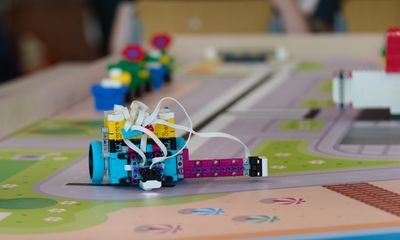
RoboMission Category
In the WRO, there are multiple categories students can compete in. The largest one, and the one we took part in, is called “RoboMission”.
The challenge is to design, construct and program an autonomous robot that can solve specific challenges on a field. Because the field is set up randomly each round, the robot needs to be able to make its own decisions during the run.
Teams consist of either 2 or 3 students and a coach. There are three different age groups: Elementary (8-12), Junior (11-15) and Senior (14-19). Since 2025, the hardware and software can be chosen completely freely. There are just some restrictions on size, weight and number of actuators and sensors etc.
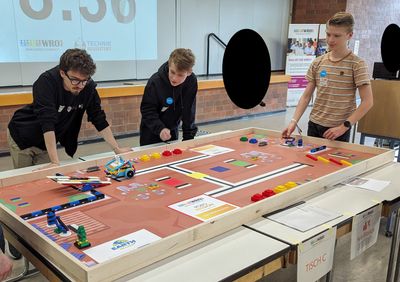
How I Got Involved
In my neighborhood there is the MINT Werkstatt, a room for children and teens to learn about various STEM topics (science, technology, engineering, mathematics). I’m helping out there occasionally by teaching some coding, Blender, Godot, 3D printing etc.
We were looking for projects that could make kids excited to learn about the STEM topics. As part of that we found the WRO and decided to take part. That was late December 2023. We were lucky to get two Lego Spike sets donated by the city which allowed us to get started.
After finding two student groups who were motivated to take part, we got started training. Luckily, the way robotics sets are designed is mostly self-explanatory for students, so that they can easily learn the basics by themselves with fairly little oversight. That was also good for me, since I obviously also had another job to do. Since they were training in the MINT Werkstatt, there was always someone else besides me who could look after them. Otherwise, none of that would have been possible, so thanks for that!
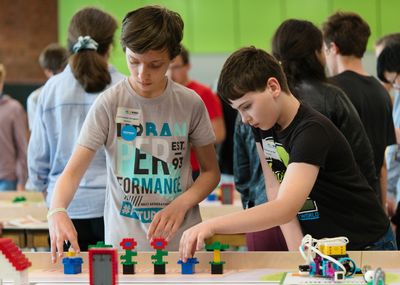
My involvement on helping these first teams was mostly on the side of motivating them when they got stuck, or encouraging them to rethink what tasks to prioritize in order to make better progress. I didn’t teach them any specifics other than maybe how to follow a line. I only learned later how to teach them more specific things without helping them directly with the tasks they are supposed to solve themselves.
First Regional Competition
Most of the time we were training once per week. However, in the one or two weeks before the competition, we trained way more often. But that was expected from my side and totally fine.
Then the day of the first competition arrived. Everyone was somewhat nervous is this was a first for all of us. Especially, the younger team didn’t really have any competition experience like this before, so that was bound to become a great lesson for them.
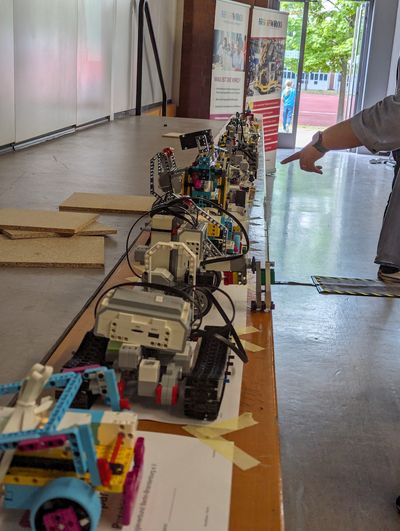
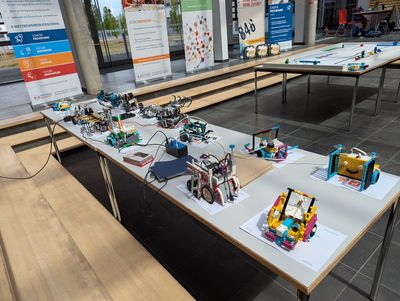
Not everything went as we had hoped, and we ended up in the middle or lower third of all participating teams with both teams. The younger team struggled a lot with the color sense, which didn’t work as expected. Probably would have been good if we would have spent more time going over how to use the color sensor more reliably and also how things could be calibrated during the competition for the new environment light.
Overall, it was a great experience for all of them. It’s impressive how much the students can learn by just taking part in the competition even if not being close to winning. Just seeing all the other robots, seeing how others solve the same problem and just being in-it-together was incredibly useful. The younger team took part in another competition later this year as well, and they were much more confident and worked much better as a team.
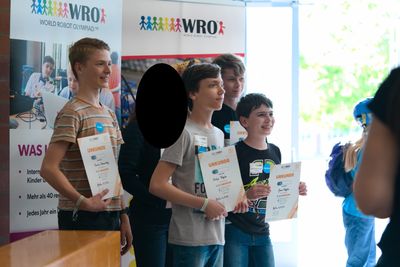
Bringing WRO Home
In November 2024, we had a smaller tournament in my hometown. This time, the only category was the “Starter-Program” which is great for getting to know the WRO. In this category, the tasks are very similar to RoboMission but a bit simpler. The teams also don’t compete with each other as they are assessed independently. That also means that it’s not possible to qualify yourself to the German finals though.
To me, the highlights of this tournament was (1) seeing how determined our one-girl team was and (2) how much better the team I coached a few months prior became. Both, in terms of being able to solve the problems and working as a team.
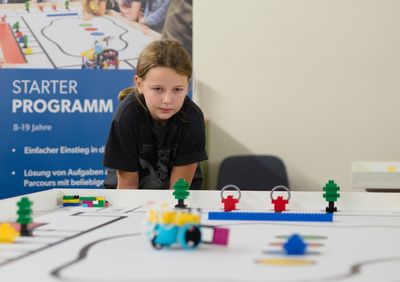
Inviting More Teams
In the following year, a regional tournament was organized in my hometown. In the MINT Werkstatt, we already had 2 new teams. However, this time we also wanted to get more local teams to be involved, besides just us. Previous attempts with just contacting schools and asking if they’d like to join didn’t really work out (even if it was a sponsored competition where they didn’t have to pay anything themselves).
I then made the suggestion that we could offer some teachers to go into their classrooms and to present the WRO (and our MINT Werkstatt) to the students and teachers alike. This worked out quite well. We spend 45 minutes in two 5th grade classes and the students were very interested. Then it only took 2 weeks until two teams were formed, and they started training. We also helped them get the materials they needed to participate. Extra bonus for me was that this was my old primary school, it was great to be back there after such a long time.
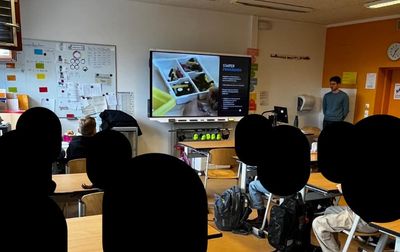
They had a great teacher working with them. I only dropped by there 3 or 4 times during training sessions to check on their progress and teach a few specifics as necessary.
We did the same in another school. While students were similarly motivated, we didn’t manage to get teams from that school yet. Maybe we’ll get there eventually, will see. In yet another school, we helped a bit with providing materials for them to be able to participate but nothing beyond that.
Second Regional Competition
This time around, I was at least indirectly involved with 6 different teams from 3 organizations, which was quite great. It was very nice to see this become a bigger thing in my hometown compared to the year prior. The event location was great too.
Our teams did a great job. It was fascinating to see how some of the children that easily lost focus during training were suddenly able to fully focus on the task. So much so, that one of our teams even won in their category which qualified them to the German finals a month later. That came kind of unexpected but was even better because of that.
What I’m especially proud of was that the winning team won because they were better in the second half of the tournament where they had to solve new tasks all by themselves without outside help. In the first half, they “just” had to show what they prepared in the weeks prior to the event where in theory the coach can help a lot.
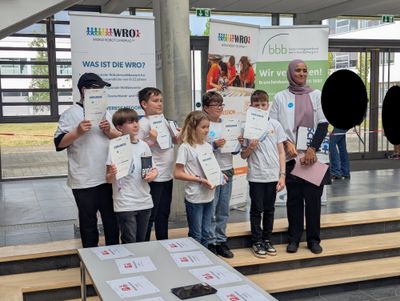
Finally Doing Some Proper Training
While the team that won the regional finals was quite good already, they already hit a plateau. Basically, they were good at programming exactly how the robot is supposed to move but so far lacked the ability to do error correction and to work with sensors.
Especially, realizing the importance of error correction is a major thing the students have to learn. Particularly, for the younger students noticing that this is even a thing seems to be difficult. I guess that’s because you can solve all the simpler tasks without it. But by the time the robot moved across the field twice, it’s typically off by at least a few centimeters in a random direction already, making tasks that require precision impossible.
Intuitively, the students attempt to tweak numbers in their program based on the final position of the robot. However, since that position is somewhat random, those tweaks generally don’t help. Or if they do, that’s by coincidence.
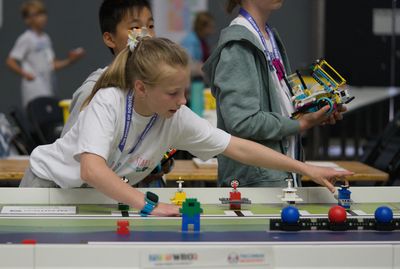
Luckily, there is a fairly simple way to do error correction that works in the majority of cases: just drive against the wall to align the robot to it and to reset its error in one direction. By driving into a second wall, the position of the robot can become mostly error free again.
We then did a series of exercises where they were supposed to drive to specific locations on the field, with sub-cm precision. At the same time I also tried to teach them “Programming by Intention”. By that I mean that I wanted them to know beforehand how they want to drive exactly before even doing the first test. They couldn’t quite believe that they would be able to write the full (simple) program without testing, but in the end they became quite good at it, which helps a lot with their confidence.
German Finals
The German finals were a much bigger event compared to the regional competition. It was a two-day event with more than a hundred teams in a different city that we had to travel to.
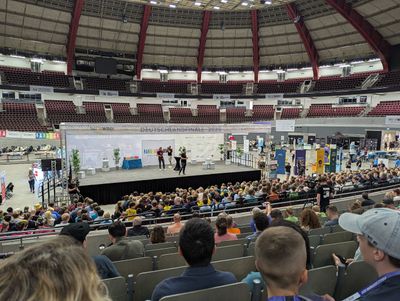
Our trip there was kind of bad in the sense that we arrived after midnight because of a >4h train delay due to a (admittedly very strong) storm. Not a great start given that the tournament started early next morning. Luckily, that didn’t seem to affect them too much in the end.
Similar to the regional tournament, the German finals were split into two parts. On the first day, they had three chances to show how many points their robot can gather on the tasks we knew beforehand with a minor modification. On the second day, they got entirely new challenges on the same field they had to solve within 2-3h.
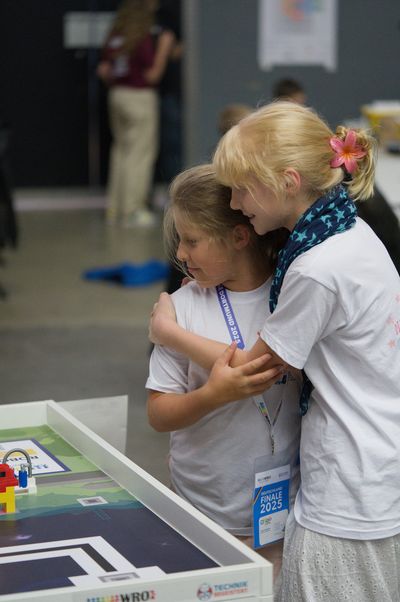
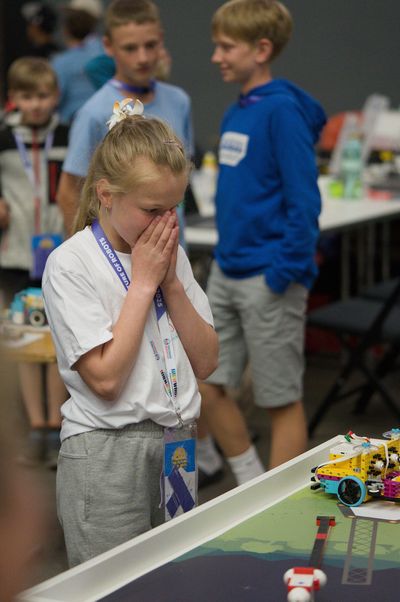
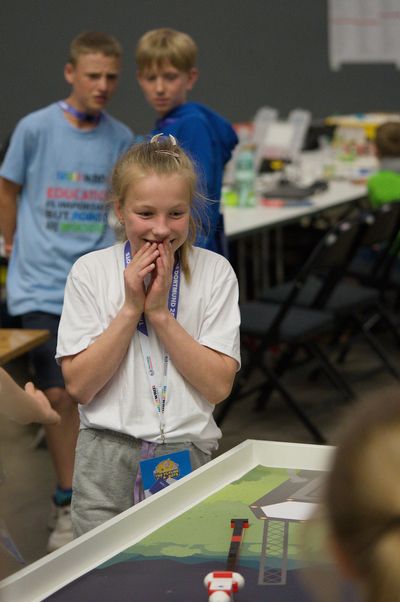
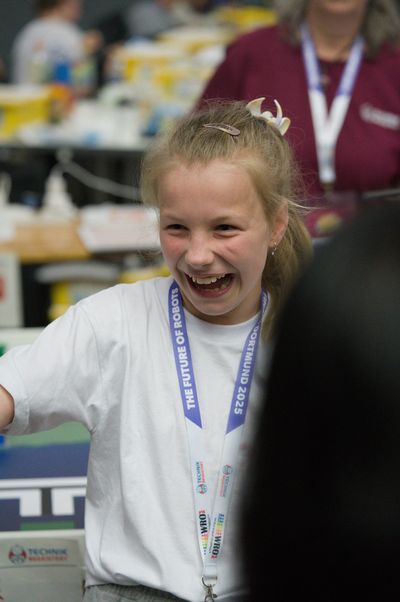
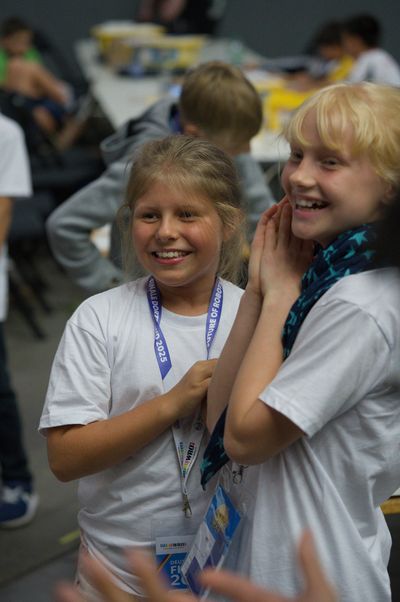
There were some up and downs during the tournament, but in the end our team became 15th place in their category. That is out of 28 during the finals and out of 172 in all of Germany. Pretty good given that they just started learning about robotics a few months prior.
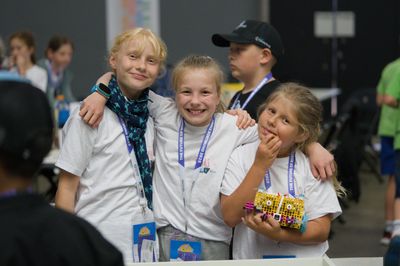
Future
I hope to be able to coach more teams in the years to come. Having seen the impact some “proper” training can have, I’m also more motivated than ever to do more of that. It looks like we’ll have the next regional competition in my hometown again, so the chances seem pretty good.